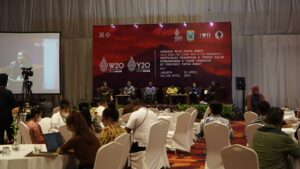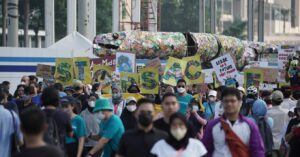
The suspended economic activities due to Covid-19 pandemic has given Earth chance to a self-regeneration. During the pandemic, the sky above Jakarta is blue marking clean air ambiance. It is a rare view that has nearly never happened. In wider extent, the Meteorology, Climatology and Geophysics Agency (BMKG) found that air quality in Indonesia in March 2020 has been cleaner than that of the same period last year.
This sort of change does not merely happen in Indonesia. Small fish start swimming around the getting-crystal clear canals in Venetia. Ganges River in India has cleaned up. Prior to pandemic, water stream in both canals and river used to be dirty and muddy partly from waste disposed by tourists. Pollution slows down in New Delhi. In Paris, pollution is said to have 30 percent drop.
Regarding the phenomenon, lives of mankind will not be the same following the pandemic. Self-care with mask and hand washing will be deemed common thing. All those habits will be hailed as a new normal. The new normal could be applied in a bid to improve our relation to the nature. Earth has been changing during the pandemic and it is a call for us to improve our relationship with the nature.
Andi Kurniawan, Chairman of Brawijaya University’s Center for Coastal and Marine Studies, said that Indonesia is an archipelagic country with the second longest coastal line in the world. Andi considered that the new normal should be applied in the utilization of fisheries and maritime resources. “The new normal is to utilize them (fisheries and maritime resources) referring to the environmental sustainability as the standard,” he said in a webinar on “Fisheries and Maritime Sector Hampered by Omnibus Virus” on 12 May 2020 organized by EcoNusa.
As to Andi, the various damages of fisheries and maritime resources serve as warning to the next generation to respect ecological capacity. Excessive exploitation on behalf of economic growth will only be burdensome and sparking future disaster. “We could hardly get economic benefit from ocean if we fail to safeguard the ocean condition naturally,” said Andi.
Besides, the new normal perspective in the utilization of maritime and fisheries resources could help Indonesia meet the achievement of Sustainable Development Goals (SDGs). This goes along with the Goal 14 of the SDGs on “Protecting Ocean Ecosystem” such as protecting biodiversity and sustainable fishing.
“Some targets of the Goal 14 should have been achieved in 2020. But Indonesia still has very big homework to meet those targets,” said Stephanie Juwana, Director of Indonesian Ocean Justice Initiative (IOJI).
Stephanie worried if the Draft of Omnibus Bill on Job Creation will impede the government’s efforts to meet the SDGs targets. Such worries are seen from sanction mechanism towards industrial players. Violation of fisheries and maritime activities should have been charged by criminal sanction will be amended into administrative sanction as mandated by the Draft Bill here.
As to Stephanie, legal compliance in ecological management is based on two major tenets. First, a state should not diminish the existing ecological protection. Second, a state should keep improving its policy on ecological management and protection on the basis of scientific studies and sustainable policy.
“The regulation in fisheries and maritime sector should have been that way given the fact that it is related to the natural resources management and protection of ocean ecosystem,” Stephanie said to participants of webinar.
Editor: Leo Wahyudi







